Ford Ranger vs Chevy Colorado: 2024 Comparison

Midsize trucks have never been better. They’ve also never been newer at the same time, as three of the best sellers have been completely redesigned within two years of each other (four if you count the Colorado’s GMC Canyon twin). In this comparison of specs and impressions from Autoblog reviews, we look at the 2024 Ford Ranger and 2024 Chevrolet Colorado, including their performance off-road versions, the Ranger Raptor and Colorado ZR2.
Ultimately, which one of these midsize trucks is better for you probably comes down to personal need – are you looking for a work truck, a smaller and more maneuverable daily driver than a full-sizer, or a bad-ass, gorge-jumping off-road truck? Maybe something in between? Whatever the answer, there’s a decent chance the Ranger will be a better choice for one while the Colorado is better for another. It can also come down to your budget or how much equipment you’re looking for.
We take a look at various attributes below to see which of the Colorado and Ranger might be better suited to different priorities and preferences.
Which is more powerful?
Winner: Ford
The Ranger’s standard 2.3-liter turbocharged four-cylinder produces 270 horsepower and 310 pound-feet of torque. The Colorado Work Truck and LT trims have a 2.7-liter turbo-four good for 237 hp and 260 lb-ft. If you’re looking at lower trim level trucks, the Ranger has a big advantage. The Trail Boss and Z71 “high-output” version of the 2.7-liter cranks things up considerably to 310 hp and 391 lb-ft. The ZR2 produces 430 lb-ft. That’s obviously a considerable advantage over the Ford, but the Ranger will soon be available with a 2.7-liter turbo V6 good for 315 hp and 400 lb-ft of torque. We didn’t know which trim levels this will be offered with or how much it will cost at the time of this writing, especially relative the high-output Chevy trim levels.
Ultimately, then, this is a hard one to answer, but considering Chevy has no real answer for the Ranger Raptor’s 3.0-liter turbo V6 (405 hp, 430 lb-ft), we’re giving this one to Ford on the whole.
Which gets better fuel economy?
Winner: Ford
The Ranger’s standard 2.3-liter turbocharged four-cylinder returns 22 mpg combined regardless of whether you get a rear- or four-wheel-drive truck. Opting for the 2.7-liter turbo V6 lowers fuel economy to 20 mpg combined. The Colorado’s standard 2.7-liter turbo-four manages 21 mpg combined with RWD and 20 mpg combined with 4WD. Its high-output 2.7-liter engine upgrade lowers fuel economy to 19 mpg combined (4WD only) or 16 mpg with the ZR2. Even the Ranger Raptor achieves 17, so advantage Ford across the board.
Which tows more?
Winner: Colorado
The Ranger’s max tow rating is 7,500 pounds, regardless of engine and drivetrain. The Colorado is 7,700 pounds, so it eeks this one out.
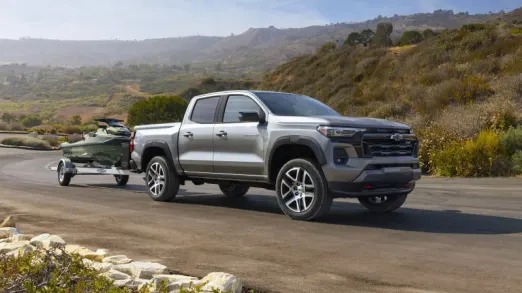
Which has a nicer interior?
Winner: Ranger
In terms of design, we would probably say the Colorado has the more attractive interior. That’s especially the case in upper trims that add padded simulated leather to interior surfaces and colorful contrasting stitching. That said, the Ranger has more consistent materials quality throughout its trim level lineup. There is a much bigger difference between the hard plastics found in a Colorado LT and the ritzier trappings in a Z71. Of course, if you really want a nice truck interior, checking out the Colorado’s GMC Canyon sibling is a good idea, especially the Denali.
Which has better infotainment technology?
Winner: Tie
This is really hard because both trucks have impressive touchscreen infotainment systems. Every Colorado has an 11.3-inch landscape-oriented touchscreen running a user-friendly interface with Google Built-in software that runs Google Maps and offers up additional apps from the Google Play Store. That’s in addition to wireless Apple CarPlay and Android Auto. The Ranger has two touchscreen size options, 10- and 12-inches, both of which are portrait-oriented. It’s actually a bit difficult to tell them apart. We like that you can split the screen between a new, square-orientation Apple recently devised for CarPlay along with an additional native Ford menu screen. We’re going to call this one a tie, because both Ford and Chevy systems are quite good, and it would really come down to personal preference.
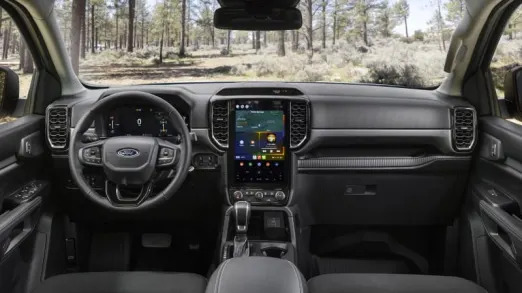
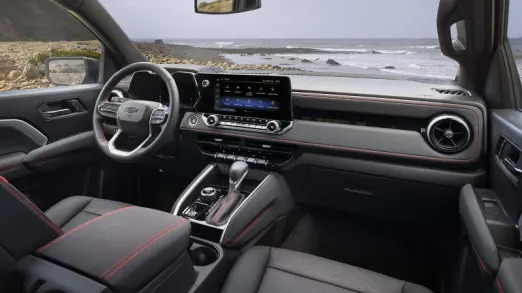
Which has the bigger back seat?
Winner: Tie
Both trucks are now only offered with crew cab body styles. They also have virtually the same amount of legroom on paper at 34.6 inches for the Ranger and 34.7 inches for the Colorado. The Ranger has 1.5 inch more rear headroom, but we’ve had someone 6-foot-3 in the back of both and his head wasn’t touching the ceiling in either case. This is a tie.
Which has more cargo capacity and functionality
Winner: Chevrolet
The back seats may offer the same space, but the Colorado’s is more versatile. Its seat bottom is split 60/40, making it easier to carry luggage or other cargo on one side while still keeping a seat open. The Ranger has a one-piece seat bottom that flips up, or a one-piece seatback that folds down to store cargo on top. Basically, you’re choosing between people or cargo.
The Colorado’s bed is 5-foot-1-inch long. It features a clever tailgate design that includes a storage compartment and a support cord that can be hooked in such a way that the tailgate stays propped open half way. We also like the Colorado’s corner steps that make it easier to step into the bed. The Ranger has side steps between the bumper and wheel, but it’s more intended for leaning over the side of the bed. The bed itself is also a whisker shy of 5 feet long, so it is technically smaller. Both trucks offer a 120-volt power outlet in the bed.
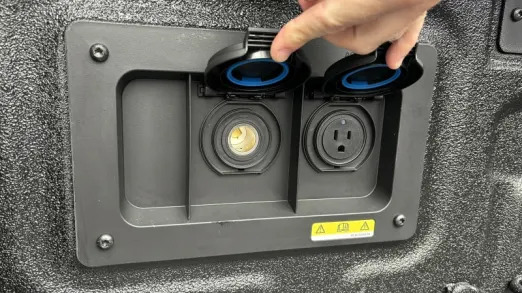
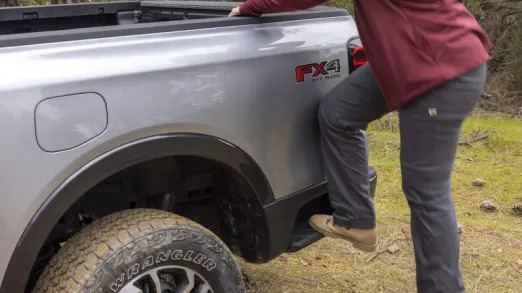
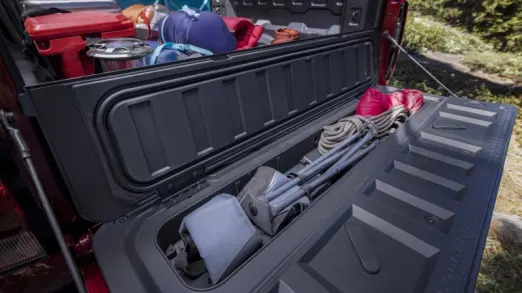
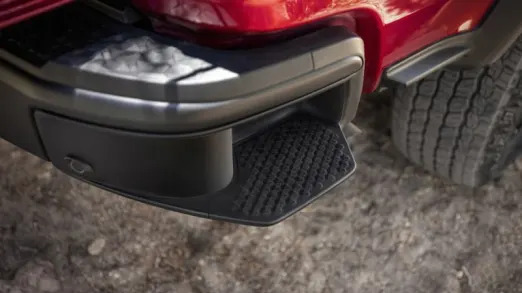
Clockwise from top left: Power outlets and side step of the Ford Ranger; corner step and tailgate storage bin of the Chevy Colorado
Which is safer?
Winner: Inconclusive
Both the Colorado and Ranger come with a large suite of driver assistance systems as standard equipment including forward collision warning and automatic emergency braking, auto high-beams, lane departure warning, and lane-keeping assist. Blind-spot warning is included on all Rangers but the base XL. That feature is included in the Colorado’s optional Safety package along with enhancements not available on the Ford: blind-zone steering assist and rear cross-traffic emergency braking. Adaptive cruise control is optional on both.
Neither the Colorado nor Ranger have been crash tested by a third party. As such, the Colorado may have an advantage here if you check the Safety package box, but otherwise this is inconclusive without crash test ratings.
Which is better to drive?
Winner: Ford
We haven’t had a chance to drive this pair directly back-to-back, but in our experience, the Ranger is the more refined truck. It still has the usual body-on-frame wiggling and jiggling over bumps, but its damping is spot-on, sopping up bigger bumps while controlling rebound exceptionally well. It feels sophisticated. Chassis response and body motions on winding mountain roads are also very good for a small truck, but the steering is too numb, especially on center, and is a letdown given the rest of the dynamic package.
The Colorado is impressive in its own right by small truck standards with better steering than the Ranger, but we don’t think its ride and handling are quite as impressive. We also find its high-output engine to be very whistly and gravelly in the noises it makes, while its base engine is a tad gutless.
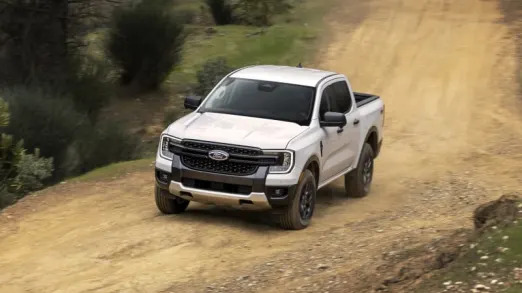
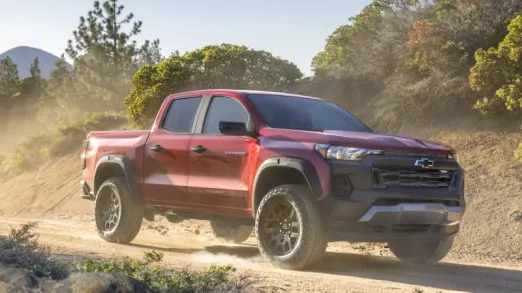
Ford Ranger XLT and Chevy Colorado Trail Boss
When was the last time they were redesigned?
Winner: Tie
The Ranger is new for 2024, whereas the Colorado was all new for 2023. The Ranger’s frame dates back further, though, so we suppose it wasn’t literally all-new. We’re not sure how much that matters. Their newness is similar, this isn’t a defining factor.
Are there versions that stand out more than others?
Winner: Tie
Both the Colorado and Ranger offer off-roader models that are extremely capable and extremely cool. The Ranger Raptor (pictured below left) boasts more power and a coil spring rear suspension, while the Colorado ZR2’s DSSV spool-valve dampers work wonders off-road and on. The ZR2 Bison (pictured below right) then takes things even further as the unquestioned rock-crawling mountain goat of the group. We’re not sure how you objectively pick among them. Depends on taste and what you want to do.
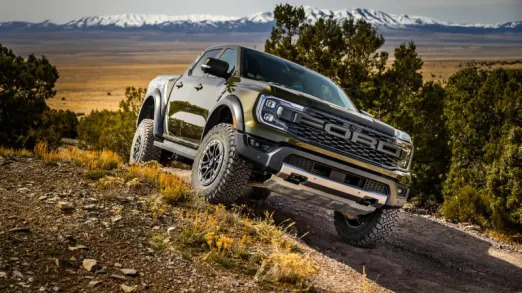
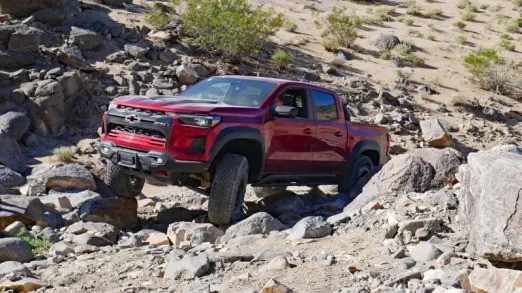
Which provides better value?
Winner: Chevrolet
This is complicated given engine choices and differences in optional packages and trim levels. Apart from the similarly priced entry-level trims, the Colorado and Ranger trims don’t really align. In general, though, it’s cheaper to get into the Colorado. Even the ZR2 is about $7,000 less expensive to start than the Raptor.







